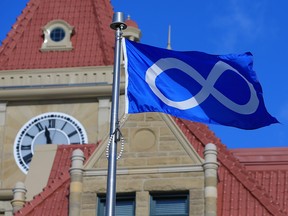The constitution outlines a governance structure for the Métis Nation of Alberta and a bill of rights for members

Article content
A number of Métis Nation and settlement leaders have voiced opposition to a new constitution as the Métis Nation of Alberta seeks self-governance.
Advertisement 2
Article content
For the month of November, the approximately 50,000 eligible members of the Métis Nation of Alberta vote on the Otipemisiwak Métis government constitution. The constitution outlines a governance structure for the nation and a bill of rights for members.
Article content
Leaders from a number of Métis nations and settlements met in Edmonton last week to discuss their opposition to the constitution and the MNA’s claim to governance over Métis communities, according to Ron Quintal, president of the Fort McKay Métis Nation.
Quintal said they are not opposed to the Métis Nation of Alberta having a constitution, but are concerned about the effect it could have on Métis people in Alberta who are not members.
“The constitution is not in the best interest of the Métis citizens of Alberta in its current form,” Quintal said. “Through the discussions with the settlements, there was an alignment regarding the spirit of the constitution and what we believe the constitution was set up to do.”
Advertisement 3
Article content
He said there was opposition to the possibility of the MNA taking away authority from non-members and representing all Métis rights in the province.
-

With a view to self-governance, Métis Nation of Alberta is preparing for the vote on the constitution
-

Opinion: Time for Métis Nation of Alberta to approve missing piece for self-government
Those opposed have reached out to the federal government in an effort to address their concerns, according to Quintal. The Métis groups working against the ratification of the constitution are prepared to take the issue to court.
The communities represented at the meeting in Edmonton include: Fort McKay Métis Nation, Willow Lake Métis Nation, Buffalo Lake Métis Settlement, Peavine Métis Settlement, Kikino Métis Settlement, Lac Ste. Anne Métis Community Association, Cadotte Lake Métis Nation Association, Athabasca Landing Métis Nation, Lakeland Métis Community Association, Owl River Métis Community Association, Chard Métis Nation, Lethbridge Métis Local No 2003, Edmonton Metis Community Association and the Mountain Metis Local No 1994.
Advertisement 4
Article content
The ratification vote comes after an agreement between the MNA and the federal government was signed in June 2019 giving the nation the inherent right to self-government. Similar agreements were made between the federal government and other Métis nations.
Garrett Tomlinson, the MNA’s senior director of self-government implementation, said groups of individuals who are not part of the MNA are free to continue their own journey towards reconciliation and self-government if they wish, even if the constitution is ratified.
“The MNA only represents its citizens, so those who have voluntarily authorized the MNA to represent them,” Tomlinson said, adding that’s about 56,000 people in total.
He said there will always be people for and against issues that are voted on within the democratic process. The vote must pass with at least 50 percent plus one of those casting a ballot.
Advertisement 5
Article content
“We are confident in the turnout and that many people will get involved in this process because it is such a historic reconciliation process,” said Tomlinson.
“This is really the last step towards self-determination and reconciliation, and we really encourage everyone to come out and have their say, whether for or against. It is critical that they make their voices heard.”
The MNA existed under Alberta’s Associations Act, which applies to groups such as unions and non-profit organizations. The constitution will create a fiscal relationship with Ottawa and the MNA will be able to offer services directly to its citizens.
Métis people from across Alberta gathered in Calgary on Sunday to celebrate Métis Week and honor their culture, traditions and way of life, and many took the opportunity to vote on the constitution.
Votes are cast by mail-in and online ballots, and polls close November 30. There are also personal polling stations in around 40 communities across the province.
Results should be available within a few days of late November, according to Tomlinson.
sbabych@postmedia.com

